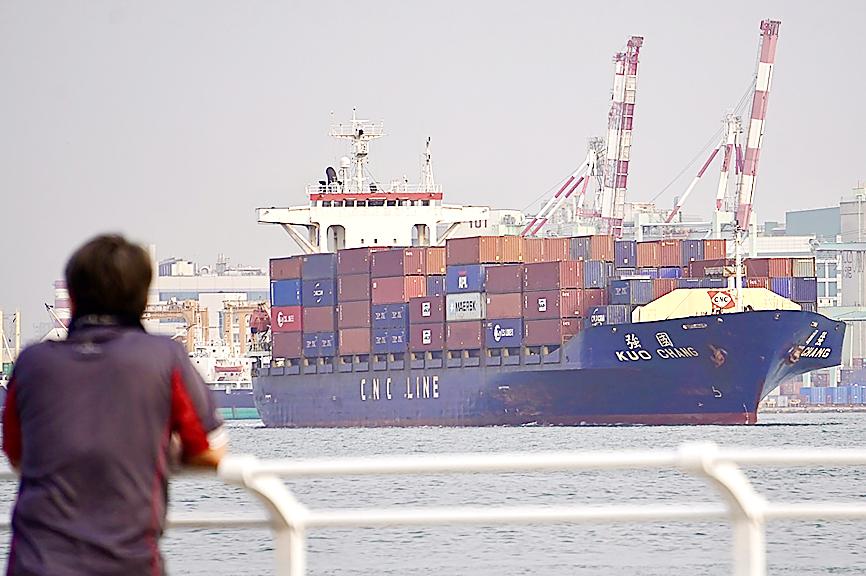Exports last month soared 27.1 percent year-on-year to a record US$35.89 billion, as inventory demand for all product categories gained unprecedented traction amid component shortages and shipping delays, the Ministry of Finance said yesterday.
The growth momentum might extend into this quarter, buoyed by expectations of a global economic recovery, although the COVID-19 pandemic continues to pose uncertainty, the ministry said.
“Component shortages and shipping delays have prompted companies to build up and vie for tech and non-tech products, and push up their selling prices,” Department of Statistics Director-General Beatrice Tsai (蔡美娜) told a news conference in Taipei.

Photo: CNA
The phenomenon is supported by economic improvement around the world following vaccine rollouts, Tsai said, adding that exports this month might also increase by a double-digit percentage point to more than US$30 billion.
Shipments of electronics surged 24.5 percent to US$13.45 billion, led by a 24.5 percent increase in semiconductors, a 45.2 percent jump in capacitors and a 35 percent gain in LEDs, the ministry said in its monthly report.
Local suppliers of chips and passive components have indicated plans to increase selling prices, as demand shows no signs of abating, it said.
Exports of information and communications devices rose 38.9 percent to a record US$92 billion, thanks to avid demand for personal computers, accessories and related products, such as routers, switches and data storage devices, it said.
Tsai dismissed concern over double-booking, saying that order visibility is clear through next year for manufacturers of notebook computers, chips and machinery equipment.
The boom extended to non-tech sectors, as exports of plastic products and electrical machinery swelled 39 percent and 29.3 percent respectively to US$2.59 billion and US$2.46 billion, both the highest in history, Tsai said, adding that shipments of textile and mineral products swung into positive territory.
Imports, a gauge of capacity expansion plans among local firms, spiked 38.4 percent to a record US$32.23 billion, attributable to a 28.2 percent increase in purchases of industrial and agricultural materials, as well as a 36.7 percent rise in capital equipment acquisition, the ministry said.
Imports of semiconductor equipment rose 48.1 percent to US$2.86 billion, it said.
The latest data gave Taiwan a trade surplus of US$3.66 billion, a 28.1 percent increase from a year earlier.
For the first quarter, exports advanced 24.6 percent to US$97.94 billion, while imports grew 21.1 percent to US$14.55 billion, the ministry said.
The data outpaced the 16.77 percent and 10.49 percent increases the Directorate-General of Budget, Accounting and Statistics predicted in February, suggesting room for upward revisions in the nation’s export-focused economy.

South Korea’s equity benchmark yesterday crossed a new milestone just a month after surpassing the once-unthinkable 5,000 mark as surging global memory demand powers the country’s biggest chipmakers. The KOSPI advanced as much as 2.6 percent to a record 6,123, with Samsung Electronics Co and SK Hynix Inc each gaining more than 2 percent. With the benchmark now up 45 percent this year, South Korea’s stock market capitalization has also moved past France’s, following last month’s overtaking of Germany’s. Long overlooked by foreign funds, despite being undervalued, South Korean stocks have now emerged as clear winners in the global market. The so-called “artificial intelligence

NEW IDENTITY: Known for its software, India has expanded into hardware, with its semiconductor industry growing from US$38bn in 2023 to US$45bn to US$50bn India on Saturday inaugurated its first semiconductor assembly and test facility, a milestone in the government’s push to reduce dependence on foreign chipmakers and stake a claim in a sector dominated by China. Indian Prime Minister Narendra Modi opened US firm Micron Technology Inc’s semiconductor assembly, test and packaging unit in his home state of Gujarat, hailing the “dawn of a new era” for India’s technology ambitions. “When young Indians look back in the future, they will see this decade as the turning point in our tech future,” Modi told the event, which was broadcast on his YouTube channel. The plant would convert

‘SEISMIC SHIFT’: The researcher forecast there would be about 1.1 billion mobile shipments this year, down from 1.26 billion the prior year and erasing years of gains The global smartphone market is expected to contract 12.9 percent this year due to the unprecedented memorychip shortage, marking “a crisis like no other,” researcher International Data Corp (IDC) said. The new forecast, a dramatic revision down from earlier estimates, gives the latest accounting of the ongoing memory crunch that is affecting every corner of the electronics industry. The demand for advanced memory to power artificial intelligence (AI) tasks has drained global supply until well into next year and jeopardizes the business model of many smartphone makers. IDC forecast about 1.1 billion mobile shipments this year, down from 1.26 billion the prior

People stand in a Pokemon store in Tokyo on Thursday. One of the world highest-grossing franchises is celebrated its 30th anniversary yesterday.